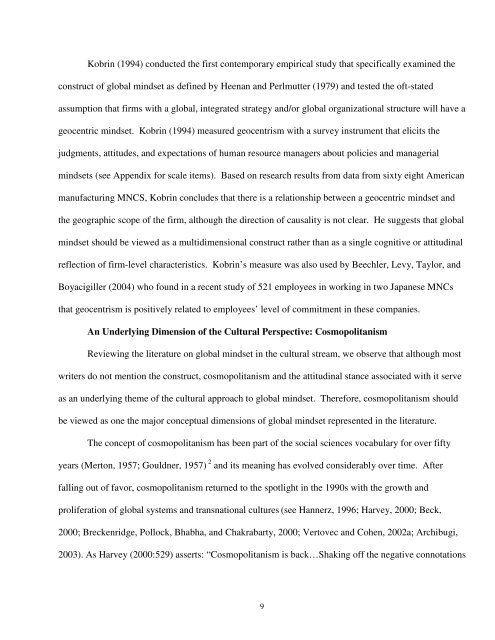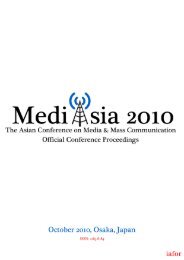What We Talk About When We Talk About “Global Mindset”
What We Talk About When We Talk About “Global Mindset”
What We Talk About When We Talk About “Global Mindset”
Create successful ePaper yourself
Turn your PDF publications into a flip-book with our unique Google optimized e-Paper software.
Kobrin (1994) conducted the first contemporary empirical study that specifically examined the<br />
construct of global mindset as defined by Heenan and Perlmutter (1979) and tested the oft-stated<br />
assumption that firms with a global, integrated strategy and/or global organizational structure will have a<br />
geocentric mindset. Kobrin (1994) measured geocentrism with a survey instrument that elicits the<br />
judgments, attitudes, and expectations of human resource managers about policies and managerial<br />
mindsets (see Appendix for scale items). Based on research results from data from sixty eight American<br />
manufacturing MNCS, Kobrin concludes that there is a relationship between a geocentric mindset and<br />
the geographic scope of the firm, although the direction of causality is not clear. He suggests that global<br />
mindset should be viewed as a multidimensional construct rather than as a single cognitive or attitudinal<br />
reflection of firm-level characteristics. Kobrin’s measure was also used by Beechler, Levy, Taylor, and<br />
Boyacigiller (2004) who found in a recent study of 521 employees in working in two Japanese MNCs<br />
that geocentrism is positively related to employees’ level of commitment in these companies.<br />
An Underlying Dimension of the Cultural Perspective: Cosmopolitanism<br />
Reviewing the literature on global mindset in the cultural stream, we observe that although most<br />
writers do not mention the construct, cosmopolitanism and the attitudinal stance associated with it serve<br />
as an underlying theme of the cultural approach to global mindset. Therefore, cosmopolitanism should<br />
be viewed as one the major conceptual dimensions of global mindset represented in the literature.<br />
The concept of cosmopolitanism has been part of the social sciences vocabulary for over fifty<br />
years (Merton, 1957; Gouldner, 1957) 2 and its meaning has evolved considerably over time. After<br />
falling out of favor, cosmopolitanism returned to the spotlight in the 1990s with the growth and<br />
proliferation of global systems and transnational cultures (see Hannerz, 1996; Harvey, 2000; Beck,<br />
2000; Breckenridge, Pollock, Bhabha, and Chakrabarty, 2000; Vertovec and Cohen, 2002a; Archibugi,<br />
2003). As Harvey (2000:529) asserts: “Cosmopolitanism is back…Shaking off the negative connotations<br />
9









